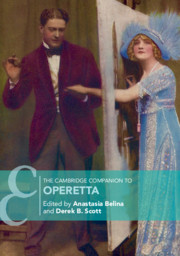Book contents
- The Cambridge Companion to Operetta
- Cambridge Companions to Music
- The Cambridge Companion to Operetta
- Copyright page
- Contents
- Illustrations
- Tables
- Music Examples
- Notes on Contributors
- Chronology, 1855–1950
- Introduction
- Part I Early Centres of Operetta
- Part II The Global Expansion of Operetta
- Part III Operetta since 1900
- 12 The Operetta Factory: Production Systems of Silver-Age Vienna
- 13 Berlin Operetta
- 14 Operetta in Italy
- 15 Operetta in Warsaw
- 16 British Operetta after Gilbert and Sullivan
- 17 Operetta During the Nazi Regime
- 18 Operetta Films
- 19 Australian Director Barrie Kosky on the Subversiveness of a Predominantly Jewish Genre: An Interview by Ulrich Lenz
- Select Bibliography
- Index
- References
18 - Operetta Films
from Part III - Operetta since 1900
Published online by Cambridge University Press: 14 November 2019
- The Cambridge Companion to Operetta
- Cambridge Companions to Music
- The Cambridge Companion to Operetta
- Copyright page
- Contents
- Illustrations
- Tables
- Music Examples
- Notes on Contributors
- Chronology, 1855–1950
- Introduction
- Part I Early Centres of Operetta
- Part II The Global Expansion of Operetta
- Part III Operetta since 1900
- 12 The Operetta Factory: Production Systems of Silver-Age Vienna
- 13 Berlin Operetta
- 14 Operetta in Italy
- 15 Operetta in Warsaw
- 16 British Operetta after Gilbert and Sullivan
- 17 Operetta During the Nazi Regime
- 18 Operetta Films
- 19 Australian Director Barrie Kosky on the Subversiveness of a Predominantly Jewish Genre: An Interview by Ulrich Lenz
- Select Bibliography
- Index
- References
Summary
It was exciting, no doubt, to watch silent films to the accompaniment of musical excerpts played by cinema orchestras, but the 1930s gave audiences the chance to see stars sing and act. That decade consequently offers valuable historical insight into vocal practice and performance technique. This chapter begins with an overview of freshly created screen operettas and of films adapting stage operettas. It briefly examines Die Drei von der Tankstelle (1930) and other German films, before moving to British and American films. The demands of film are contrasted with techniques required in the theatre. The chapter then looks at the practice of adaptation in Hollywood, and it ends with a discussion of the operetta Heimat film in Germany.
- Type
- Chapter
- Information
- The Cambridge Companion to Operetta , pp. 272 - 285Publisher: Cambridge University PressPrint publication year: 2019
References
Films Referenced
- 1
- Cited by

